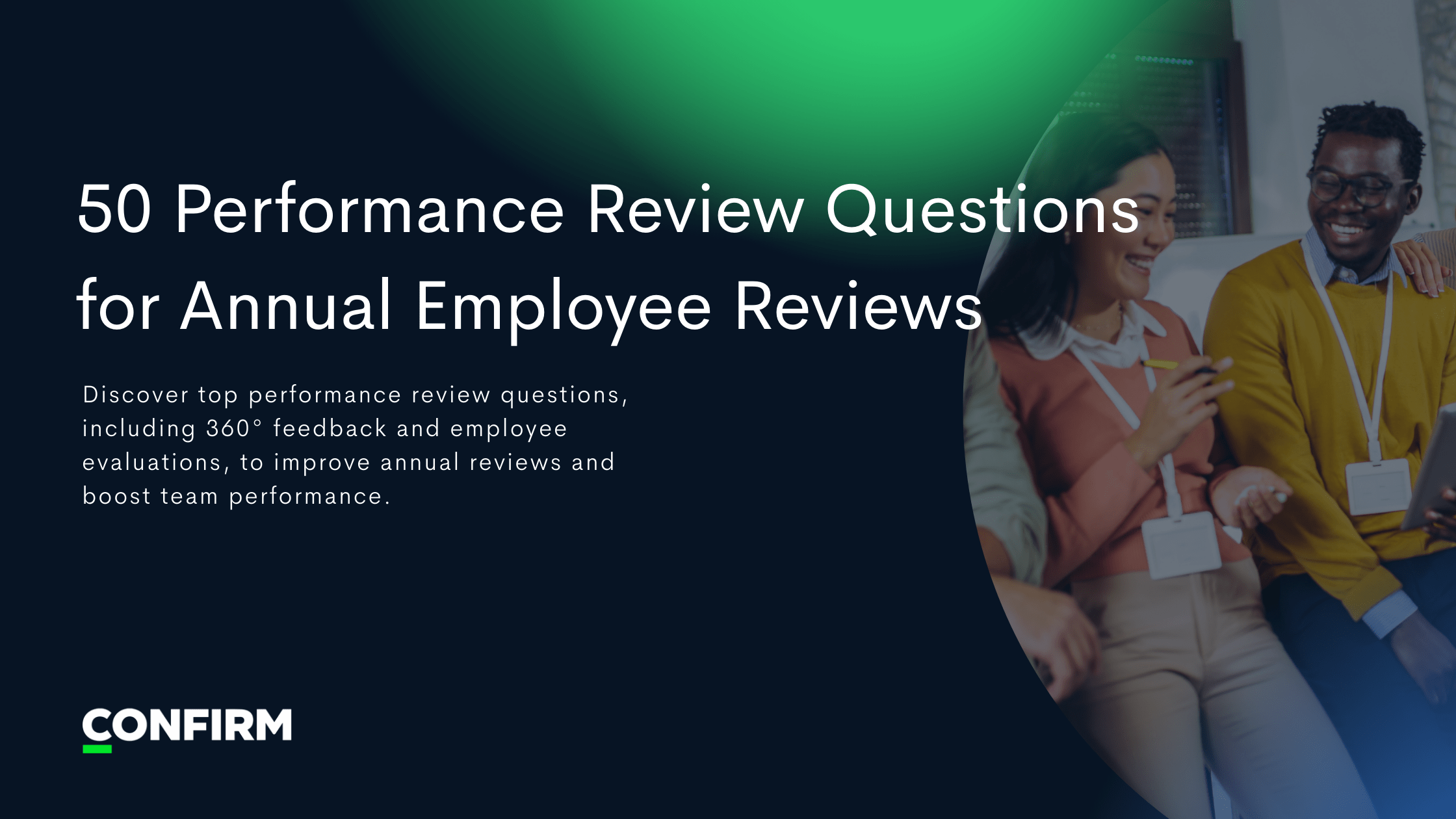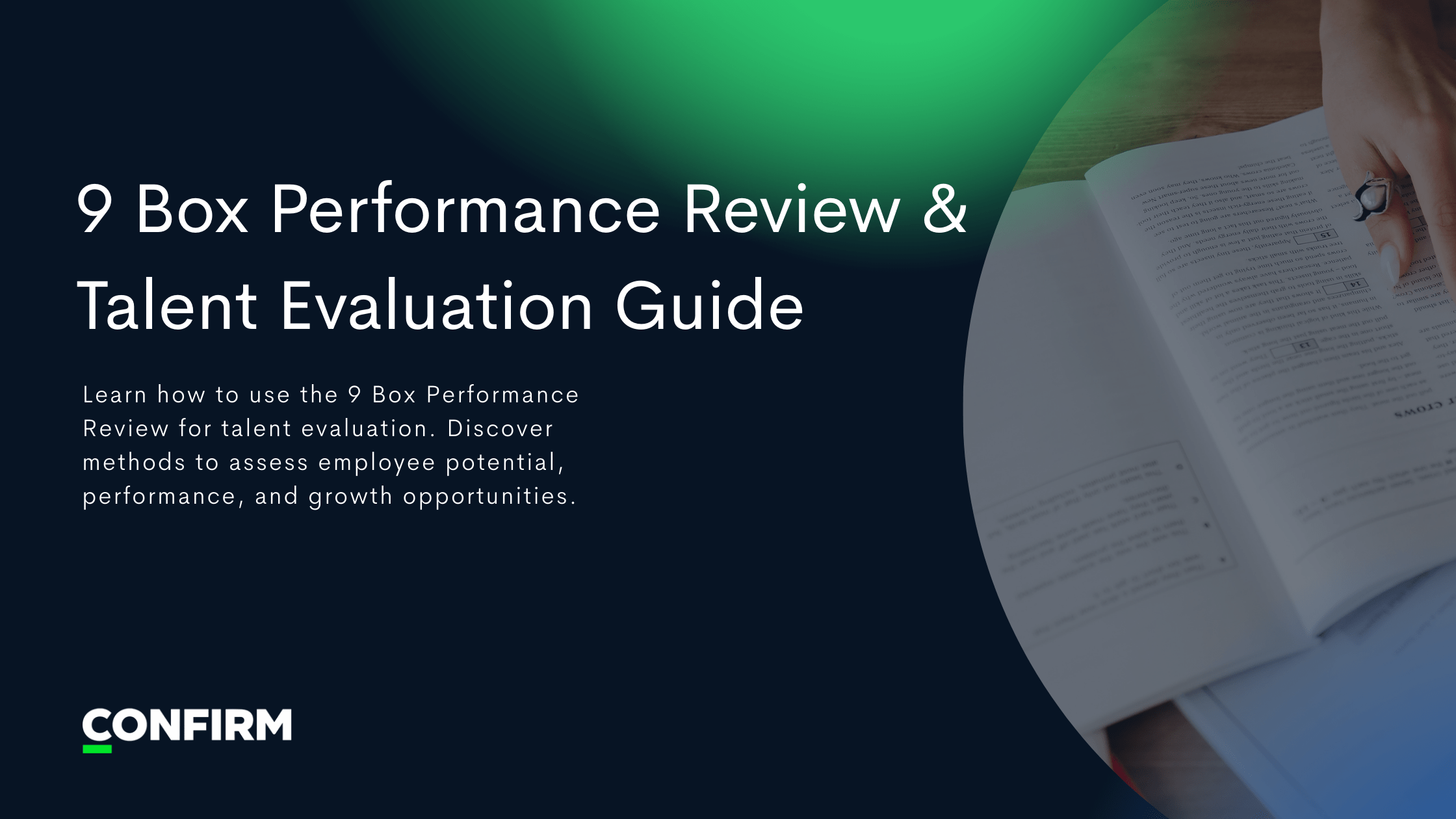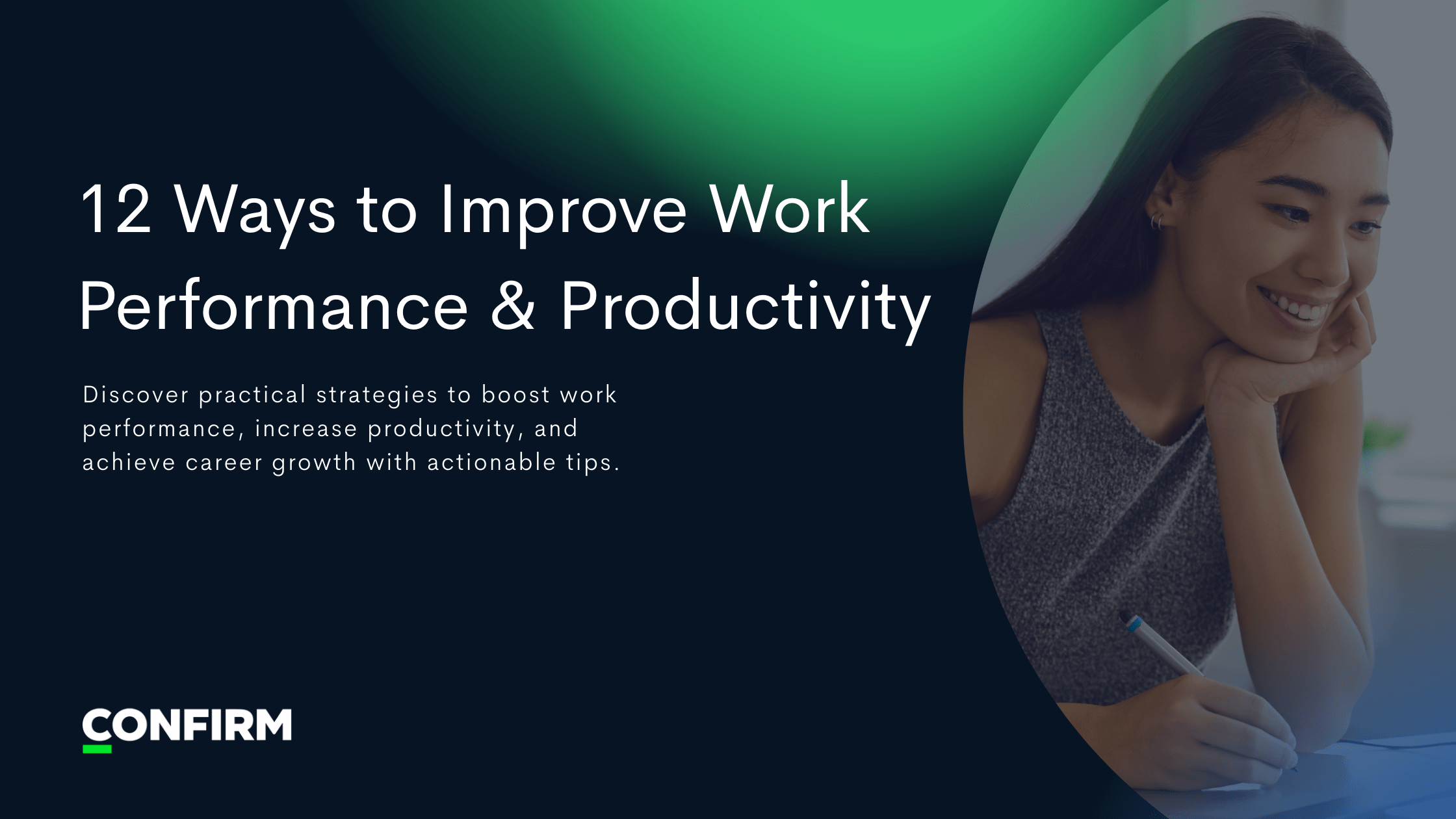
Blog post
50 Performance Review Questions for Annual Employee Reviews
Discover top performance review questions, including 360° feedback and employee evaluations, to improve annual reviews and...

Performance reviews are a critical part of employee development. Asking the right performance review questions (the kind of employee review questions often found in annual review questionnaires or 360-degree feedback surveys) can reveal insights that drive growth and engagement. This article provides a curated list of questions for performance evaluations – from self-assessment and goal-setting to teamwork and problem-solving – and offers tips on how to use these questions effectively to foster employee growth.
Why Good Performance Review Questions Matter
Asking good questions can transform a routine review into a powerful conversation about growth. They set an open, reflective tone that encourages employees to discuss their achievements, challenges, and goals. When employees receive regular, constructive feedback, they feel heard and valued – those who get meaningful feedback are 3× more likely to be highly engaged at work.
Strong questions also keep evaluations fair and objective. Using a consistent core set for everyone establishes baseline fairness, while still allowing role-specific additions where needed. This structured approach keeps the focus on actual performance rather than personal impressions. Additionally, incorporating 360-degree feedback (input from an employee’s peers, reports, and supervisors) gives a fuller, more balanced view of their performance and helps reduce bias.
For a deeper dive into effective appraisals, see our Performance Review Guide with more examples and 360° feedback tips. In short, the right performance review questions drive engagement, surface actionable insights, and make reviews more effective.
Top Performance Review Questions for Employees
It helps to organize your employee review questions by theme. Below, we’ve categorized important questions into self-assessment, goals, skill development, teamwork, and problem-solving to ensure a well-rounded evaluation of performance and growth.
Top 10 Self-Assessment Questions
Encouraging employees to assess themselves at review time gives them ownership of their narrative and promotes honesty.
- What accomplishments are you most proud of since our last review?
- Which goals or targets did you meet, and how did you achieve them?
- What were your biggest challenges this period, and how did you address them?
- In what areas do you feel you have improved, and what helped that improvement?
- What is one aspect of your work where you feel you could do better?
- How did your work this period contribute to the team’s or company’s goals?
- What feedback would you give yourself for this review period?
- Which of your strengths did you use most in your role recently?
- What new skill or knowledge have you picked up that helped in your job?
- Were there any achievements you feel were overlooked and want to highlight?
Top 10 Goal-Oriented Questions
Goal-oriented questions keep the review focused on aligning individual performance with broader business objectives. They help track progress on current goals and set new ones for the future.
- How have you progressed on the goals set during your last performance review?
- What goals have you achieved in this review period, and what was the impact?
- Which goals did you not meet, and what obstacles got in the way?
- How do your personal career goals align with the team’s or company’s objectives?
- What new goals would you like to set for the next period?
- Are there any resources or support you need to help accomplish your upcoming goals?
- How can we better leverage your strengths to reach your goals?
- Have any of your priorities changed, and do your goals need to be adjusted?
- What short-term steps will you take to work toward your longer-term career aims?
- How will you measure success for your goals moving forward?
Top 10 Skill Development Questions
Skill development and career growth are important topics in a performance review, as they highlight areas for improvement and training opportunities. The following questions help pinpoint skill gaps and development needs:
- What new skills have you learned or improved since your last review?
- Which skills do you feel you need to develop further to excel in your role?
- How have you applied any new knowledge or training in your job?
- Are there any skills outside your current job scope that you would like to develop?
- What training or learning opportunity would help you grow in your position?
- Is there a skill you have that is underutilized in your current role?
- How do you stay updated on industry changes or new tools relevant to your work?
- Have you sought feedback from colleagues on skills you could improve? What did you learn?
- What steps will you take in the next few months to advance your professional development?
- Where do you see opportunities for growth in your role, and what skills will you need to get there?
Top 10 Collaboration & Teamwork Questions
Teamwork and collaboration are critical for success in most roles. These questions evaluate how well an employee works with others and contributes to a positive team dynamic:
- How would you describe your communication style when working with your team?
- Give an example of a successful team project you contributed to. What was your role?
- How do you handle conflicts or disagreements with coworkers when they arise?
- In what ways have you supported a coworker or helped your team recently?
- How do you respond when a team member gives you feedback or criticism?
- What do you think makes your team successful, and how do you contribute to that success?
- Does everyone on the team (including you) have opportunities to voice ideas and concerns?
- How do you adapt your working style to collaborate effectively with different personalities?
- What have you done to build or maintain good relationships with your teammates?
- How could the team improve collaboration, and what role can you play in that?
Top 10 Problem-Solving & Initiative Questions
Initiative and problem-solving are highly valued traits. These questions assess how an employee approaches challenges and finds solutions:
- Describe a challenging problem you faced recently at work and how you resolved it.
- What is a process or task you proactively improved or made more efficient?
- Give an example of when you went above and beyond your normal duties to solve an issue.
- How do you handle unforeseen obstacles or sudden changes in priorities?
- When you notice something isn’t working, what steps do you take to fix or improve it?
- Have you ever initiated or suggested a new project or idea at work? What was the result?
- How do you decide which problems to tackle first when multiple issues arise?
- What do you do when you’re stuck on a problem you can’t solve right away?
- Describe a mistake or setback you encountered and how you learned from it.
- How have you contributed to innovation or new ideas within your team or department?
Performance Review Questions for Managers
Managers need feedback too. In many organizations, 360 performance review questions (collecting feedback from a manager’s team and peers) are used to evaluate leaders comprehensively. When assessing managers, the focus is on their leadership, decision-making, accountability, and ability to coach others. Here are key questions to ask when reviewing a manager, broken down by topic:
Assessing Leadership Skills
- How well does the manager communicate the team’s goals and expectations?
- In what ways does the manager inspire and motivate the team to perform at their best?
- How open is the manager to feedback and new ideas from team members?
Decision-Making & Accountability
- How effectively does the manager make decisions, especially under pressure or uncertainty?
- Give an example of the manager taking accountability for a team mistake.
- Does the manager follow through on commitments and hold team members accountable?
Coaching & Mentorship Abilities
- How often does the manager provide feedback or coaching to team members?
- Can you share an example of the manager supporting an employee’s professional development?
- Does the manager recognize individual achievements and give credit to the team for successes?
How to Use Performance Review Questions Effectively
To get the most out of these questions, set a positive, growth-focused tone for the review, tailor some questions to the employee’s role (while keeping core questions consistent for fairness), favor open-ended questions (use yes/no only sparingly), and document key takeaways with a follow-up plan. These practices ensure that performance reviews become candid, constructive conversations rather than box-ticking exercises.
Frequently Asked Questions
How many questions should be in a performance review?
There’s no strict rule, but most performance reviews cover about 5 to 10 key questions – enough to be thorough without overwhelming anyone. If you’re using a 360-degree feedback form or survey, it might include more items, but in a one-on-one review meeting it’s best to focus on a handful of meaningful questions.
Should performance review questions be the same for all employees?
Not all of them. It’s good practice to ask some standard questions to every employee (for fairness), but you should also tailor some questions to the individual’s role and goals. Different roles have different success factors, so a one-size-fits-all set of questions won’t be as effective. Instead, use a common core of questions for everyone and add specific ones that make sense for each person’s job.
How can I make performance review questions unbiased?
Use neutral, behavior-based language and avoid leading questions that suggest a “right” answer. Make sure the core questions are consistent across all employees, so everyone is evaluated by the same criteria. If possible, gather feedback from multiple sources (peers, direct reports, etc.) to get a more balanced perspective and counter any one person’s bias. By sticking to factual, standardized questions for all, you’ll keep bias to a minimum. You could also explore our AI performance review solutions.
Should performance review questions be open-ended or yes/no?
Mostly open-ended. Open-ended questions invite detailed responses and deeper insight. Yes/no questions can be used occasionally for quick checks, but they don’t provide much information on their own. If you do include a yes/no question, it should usually be followed by an open-ended question to explore the answer further. In general, prioritize open-ended questions to encourage meaningful dialogue.
How do you handle difficult answers during performance reviews?
With calm and empathy. If an employee gives a negative or unexpected answer, stay calm, listen fully, and don’t get defensive. Thank them for their honesty, ask clarifying questions, then focus on solutions or next steps. If an issue can’t be resolved immediately, acknowledge it and plan to follow up. The key is to turn tough feedback into an action plan for improvement rather than letting it become personal criticism.
How can performance review questions improve employee engagement?
Thoughtful performance review questions show employees that their opinions and growth matter – and that boosts employee engagement. When managers truly listen and act on feedback from reviews, people feel valued and more connected to their work. These conversations also help employees see how their contributions tie into the company’s goals, giving them a greater sense of purpose. Employees who receive regular, meaningful feedback are much more likely to be engaged at work.
Ready to elevate your performance review process? Empower your organization with fair, data-driven performance reviews. Explore Confirm’s performance review solutions to see how you can transform performance evaluations into a continuous engine for employee growth and success.
Ready to see Confirm in Action?
See why forward-thinking enterprises use Confirm to make fairer, faster talent decisions and build high-performing teams.








